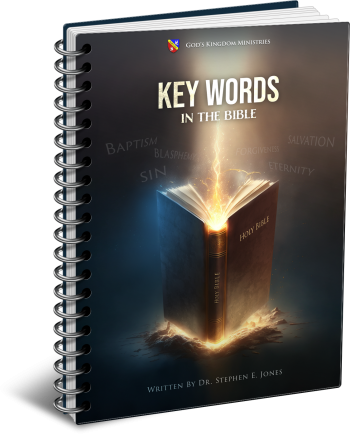Latest Posts
View the latest posts in an easy-to-read list format, with filtering options.

To understand what Scripture says, one must know the meaning of words and key concepts. This book is designed to prevent misunderstanding.
Category - General

I believe it was Saint Anselm (1033-1109 A.D.) who first stated, “All sin is reckoned as a debt.” He had noted the seamless relationship between sin and debt in Jesus’ parables. Not all debt is incurred through sin, but all sin is treated as a debt.
In the law of God, when a judge convicted a man for sinning against his neighbor, the verdict was often little more than a debt note which the sinner was required to pay his victim. The foundational principle of justice was based on the law of restitution. Exodus 22:1-4 says,
1 If a man steals an ox or a sheep and slaughters it or sells it, he shall pay five oxen for the ox and four sheep for the sheep. 2 If the thief is caught while breaking in and is struck so that he dies, there will be no bloodguiltiness on his account. 3 But if the sun has risen on him, there will be bloodguiltiness on his account. He shall surely make restitution; if he owns nothing, then he shall be sold for his theft. 4 If what he stole is actually found alive in his possession, whether an ox or a donkey or a sheep, he shall pay double.
Restitution varies, depending on the nature of the stolen item. To steal an ox was to steal the tools by which a man could make a living. An ox in those days was his tractor. Without it, he could not plow his field. Hence, the penalty is to repay five oxen—assuming the ox had already been sold or slaughtered. If the ox were to be recovered alive and intact, then the penalty was double restitution.
To steal a sheep merely deprives the owner of his assets, and so the penalty was fourfold restitution. But if the sheep is recovered alive, then the penalty is double restitution.
In the case of a stolen donkey, there is a gap in the law. If it is recovered alive, the penalty is double restitution, but what if the donkey is sold or killed? The law is silent. I believe that a donkey should be treated as a tool, because donkeys were also used to plow fields.
We see this use of donkeys in Deut. 22:10,
10 You shall not plow with an ox and a donkey together.
This shows that donkeys were often used to plow fields, but since an ox was so much heavier and stronger, a donkey would be unable to match the strength of the ox. Paul referenced this law as a principle of partnerships (including marriage) in 2 Cor. 6:14, KJV,
14 Be not unequally yoked together with unbelievers; for what fellowship hath righteousness with unrighteousness [anomia, “lawlessness”]? And what communion hath light with darkness?
A donkey is an unclean animal; an ox is a clean animal. No doubt this is how Paul was applying this law in telling people not to be “yoked together with unbelievers.” There are, of course, other applications of this principle, which lie outside the scope of this study.
When the nature of a crime makes it impossible to pay restitution, the law normally imposes the death penalty. This is why certain crimes are capital crimes, such as premeditated murder, kidnapping, adultery, and raping a married or betrothed woman. In essence, the law is powerless to correct the problem, so it defers the case to a higher court—the great White Throne judgment at the end of the age.
Murderers are unable to raise the dead, kidnappers cannot restore two people, rapists cannot undo their act. The law can punish, but it is incapable of bringing justice. Justice is not done until all the victims of injustice have been made whole. In the case of capital crimes, punishing the sinner in itself does not bring justice to the victim.
Punishment is effective only in lesser cases. Hence, in some cases where restitution is not applicable, the law allows beatings up to 40 lashes (Deut. 25:1-3). Jesus referred to this law in Luke 12:47, 48, applying it to the judgment at the great White Throne (Rev. 20:11, 12). The “many lashes” (Luke 12:47) are reserved for those who understand the law and yet mistreat those under their authority, “but the one who did not know it and committed deeds worthy of a flogging, will receive but few” (Luke 12:48).
Jesus then likened it to a “fire,” which ties the flogging to the “lake of fire” in Rev. 20:14. He said in Luke 12:49,
49 I have come to cast fire upon the earth; and how I wish it were already kindled!
Every judgment in the law is a “fire,” not literal, but metaphorical. This is because God spoke the law from the all-consuming fire on the Mount, and Deut. 33:2 (KJV) calls it a “fiery law.” Because the law is designed to be corrective in nature, Jesus wished it were already kindled. He was not anxious to make the earth a burning hell, for such an attitude would not reflect the mind of Christ or a God of love.
The concept of a burning hell is based on the idea that punishment is the same as justice. But the law of God is disciplinary and corrective in nature. So the prophet says in Jer. 2:19, “Your own wickedness will correct you.” The Hebrew word used is yasar, “to chastise, discipline, instruct, admonish, correct, teach.”
Again, we read in Psalm 94:10 and 12,
10 He who chastens [yasar] the nations, will He not rebuke? Even He who teaches man knowledge?... 12 Blessed is the man whom You chasten [yasar], O Lord, and whom You teach out of Your law.
Isaiah 26:9 agrees with this, saying, “For when the earth experiences Your judgments, the inhabitants of the world learn righteousness.” In other words, the law is a great teacher, and the judgments of the fiery law chastise sinners so that they learn to walk in His righteous ways.
We must learn to think of God’s judgments in terms of chastisement, rather than punishment. As children of God, we are all chastised in order to correct and teach us. Prov. 3:11-13 says,
11 My son, do not reject the discipline [musar] of the Lord or loathe His reproof [tokayha], 12 For whom the Lord loves He reproves, even as a father corrects the son in whom he delights. 13 How blessed is the man who finds wisdom and the man who gains understanding.
The words musar and tokayha are synonymous with yasar. Heb. 12:5, 6 refers to this discipline and correction, quoting Prov. 3:11, 12. The law of restitution also corrects sinners even as a father lovingly corrects an undisciplined son.
If a thief has no assets to pay restitution to his victim, he is to be “sold for his theft” (Exodus 22:3). In such a case, he would be sold to a redeemer who agrees to take responsibility for the debt that the thief owed his victim. The victim would then be paid in full immediately, and in exchange, the thief would have to serve his redeemer for an specified amount of time.
During his time working as a slave, he would have to learn work habits and learn not to steal again. He would learn to respect the property rights of others, because, as a slave, he himself has become the property of another man.
At the great White Throne judgment, the fiery law will be imposed upon those unbelievers who are summoned and sentenced according to the law of God. There, every knee will bow, and they will all believe in Christ and confess Him as Lord to the glory of God the Father (Phil. 2:10, 11). Yet being new believers, they will need correction and will need to learn the laws and ways of God. This will take some time.
So the same fiery law that has baptized believers in this life with the baptism of fire will then baptize these new believers as well. Those in the lake of fire will be disciplined and corrected, for their redeemers, who rule over them, will manifest Christ to them. These redeemers will be charged with the responsibility to teach them righteousness by personal example.
Yet we need to understand that true justice (by the nature of Christ) restores what is lost to all victims of injustice, while correcting the sinner and teaching him righteousness. Restitution forms the basic fabric of divine justice, for it is directly proportional to the seriousness of the crime. This follows the principle of “eye for eye, tooth for tooth” (Exodus 21:24), which, far from being cruel or merciless, is the fundamental principle of divine justice. (Keep in mind also that the victim of injustice retains the right to grant mercy and grace.)
Restitution alone provides true justice. A burning hell is not biblical justice, for it does nothing for the victims of injustice, nor does it give sinners any hope of being restored to God.
Jesus’ Sacrifice fulfilled the prophecies inherent in all of the Old Testament sacrifices. Most of those sacrifices were either cooked (for consumption) or burnt up totally. Fire was applied to these sacrifices. So why was Jesus crucified on a tree and not burned at the stake? Did they get it wrong?
No, the sacrificial fires were literal in the case of animal sacrifices, representing the fiery law as a whole. But that fire was metaphorical in the case of Jesus’ death on the cross. “The wages of sin is death” (Rom. 6:23), not a burning hell. The law makes sin sinful, and thus also makes sinners liable for the death penalty.
Jesus took that penalty upon Himself on the cross. If He had intended to put away the law, He would not have had to die, “for where there is no law, there also is no violation” (Rom. 4:15). If Jesus had put away the law, He could have saved everyone without having to die on the cross. But Jesus upheld and honored the law, submitting to its judgment for the sin of the world. He saved all mankind without putting away the law.
So at the great White Throne, some, it seems, will be given floggings (or some equivalent). Others will be sentenced to pay restitution—which, of course, they will be unable to pay, having lost all of their possessions when they died. They will have to be “sold” to redeemers who are able to pay the debt and to purchase slaves.
The lake of fire, then, is a time wherein these slaves serve out their sentences, building the Kingdom of God and learning righteousness. If it were possible for them to work enough to redeem themselves, then there might be a possibility that they could be released prior to the Creation Jubilee. But in my view, this will not be possible, and for this reason, they will continue to serve their redeemers until the great Jubilee sets all of creation free into the glorious freedom of the children of God (Rom. 8:20-22).